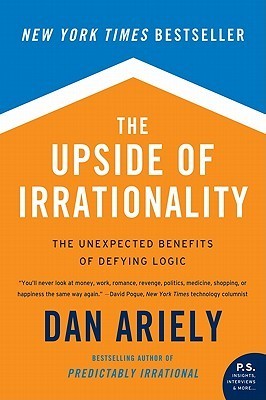
The Upside of Irrationality: The Unexpected Benefits of Defying Logic
Book Description
What if the choices you thought were irrational were actually your secret superpower? In "The Upside of Irrationality," Dan Ariely unveils a world where human quirks lead to unexpected advantages, turning conventional wisdom on its head. With captivating experiments and provocative insights, he reveals how emotions, social dynamics, and whims shape our decisions, often for the better. Discover the paradox of how our emotional missteps can lead to innovation, connection, and fulfillment. As reason gives way to impulse, will you dare to embrace the chaos and unlock the hidden potential within your irrational side?
Quick Book Summary
"The Upside of Irrationality" by Dan Ariely examines the surprising ways that our illogical behaviors can work to our advantage. Drawing from his groundbreaking experiments in behavioral economics, Ariely challenges the idea that rationality always leads to optimal decisions. Instead, he demonstrates how impulses, emotions, and social influences can foster creativity, innovation, and even happiness in our personal and professional lives. Through engaging stories and accessible science, the book offers a new appreciation for the quirks that make us human. Ariely encourages readers to embrace their irrational side, showing how our seemingly flawed judgments often yield results that logic alone cannot achieve, turning what seems like weakness into a unique source of strength.
Summary of Key Ideas
Table of Contents
The Unexpected Benefits of Emotional Decisions
Dan Ariely begins by questioning the classic assumption of rational decision-making in economics and psychology. He introduces readers to the concept that irrationality is not always detrimental; in fact, our emotional responses often illuminate what truly matters to us. Ariely uses real-life experiments to showcase how feelings, attachments, and personal history can skew our choices, yet these same forces can enrich our experiences, push us toward meaningful goals, and add depth to our lives. By recognizing and understanding our emotional tendencies, we can use them to our advantage, rather than seeing them as obstacles.
How Social Influences Shape Our Choices
The influence of social dynamics is another major theme Ariely explores. We are profoundly affected by the behaviors and expectations of those around us—far more than we usually realize. Through experiments involving generosity, workplace motivation, and relationships, Ariely demonstrates that our irrational behaviors are often amplified in group settings. However, these collective quirks can foster trust, cooperation, and even a sense of belonging. When individuals understand how social pressures shape decisions, they can better navigate group dynamics and leverage them for positive outcomes.
Leveraging Irrationality for Personal and Professional Growth
Ariely also delves into practical ways to harness irrationality for growth, both professionally and personally. He explores the limitations of traditional incentives, revealing that money isn’t always the greatest motivator—meaning, recognition, and purpose often outweigh financial rewards. By designing environments that tap into what truly motivates us, organizations can boost performance, satisfaction, and creativity. Individuals, too, can thrive by embracing projects and habits that align with their intrinsic, if sometimes illogical, desires.
Finding Meaning Through Flawed Logic
Another key insight from the book is the paradox of finding meaning in life’s imperfections. Rather than fighting our flawed logic, Ariely suggests accepting it as a reflection of our humanity. The irrational pursuit of love, passion, and personal projects leads to fulfillment that rational calculation cannot reproduce. In relationships and career choices, the willingness to follow our hearts often yields deeper connections and satisfaction, even if others see our decisions as impractical.
Harnessing Human Quirks for Innovation
Throughout "The Upside of Irrationality," Ariely encourages readers to reframe how they view the quirks and inconsistencies in their decision-making. By exploring and better understanding the roots of irrational behavior, we can use these traits to spark innovation and forge unique paths. Instead of viewing rationality as the ultimate ideal, Ariely invites us to acknowledge the hidden benefits of our impulses, biases, and emotions—unlocking deeper happiness and unexpected advantages in everyday life.
Download This Summary
Get a free PDF of this summary instantly — no email required.





